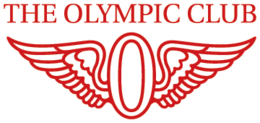Olympic Club RFC
The Olympic Club RFC is a Pacific Rugby Premiership team based in San Francisco, California and were the 2019 Division II USA national champions.[1] Known as the OC, or the Winged 'O' ruggers, the rugby team was formed in 1908 under the wing of the San Francisco Olympic Club, an athletic club and private social club which had been founded in 1860.[2][3]
 | ||
| Full name | Olympic Club Rugby Football Club | |
|---|---|---|
| Union | USA Rugby | |
| Nickname(s) | Winged 'O' ruggers | |
| Founded | 1908 | |
| League(s) | Pacific Rugby Premiership | |
| ||
| Official website | ||
| www | ||
Olympic Club Rugby is one of the oldest rugby clubs in California and has produced a number of notable players who have represented the United States national team. These include Olympic gold medal winners from 1920 and 1924, Charles Doe, Dink Templeton, George Dixon, and Rudy Scholz.[4]
More recent U.S. Eagles representatives include Brian McClenahan and Colin Hawley.[2]
History
Early years
The game of rugby in the Bay Area received a boost in 1906 when, citing concerns about the safety of American football, the universities of California and Stanford dropped football in favor of rugby. The Big Game was played as rugby from 1906 to 1914.[5]
In 1907 an Englishman and rugby devotee named Edgar Pomeroy joined the San Francisco Olympic Club and lobbied for the formation of a rugby team. With the support of the club president and the board, the Olympic Club rugby team was formed in 1908, playing five other teams including Stanford and University of California in the first season. The club won the local championship the next season, in 1909.[4]
Pomeroy and fellow Olympic Club member Joseph Hickey became officials with the California Rugby Union. They arranged a series of touring matches to the West Coast for New Zealand's All Blacks team in 1913. On October 4th, the Olympic Club played the champion All Blacks side at St. Ignatius Field. While the OC lost 19–0 it was a closer match than the game played a month later in which the United States national side was defeated 51–3. New Zealander Jim Wylie stayed in California after the tour, later joining the Olympic Club and becoming a coach of the side.[4] The colleges resumed playing American football after 1914 but rugby had gained a toehold in the Bay Area.
1990 onwards
References
- "2019 Club National Championship Recap". USA Rugby News. 2 June 2019. Retrieved 19 September 2019.
- "San Francisco Olympic Club Rugby Match in Wellington". The Diplomatic Post. US Embassy to New Zealand and Samoa. 22 September 2011. Archived from the original on 24 January 2015. Retrieved 25 January 2015.
- Janssen, Frederick William (1888). A history of American amateur athletics and aquatics: with the records (Digitized March 9, 2010 ed.). Outing Company. pp. 131–2.
- "History". Olympic Club. 29 May 1985. Archived from the original on 11 July 2012. Retrieved 12 January 2015.
- Elliott, Orrin Leslie (1937). Stanford University – The First Twenty Five Years 1891–1925. Stanford, California: Stanford University Press. pp. 231–233. Retrieved November 10, 2010.